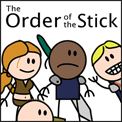Ambushed on Donahue
Sirlin.net is a blog I read regularly, written by self-described "game theorist" and 2006 Robbie Award winner, David Sirlin. Like everything else in my life, I had fallen quite a bit behind in my reading when I dove head-first into my new job and my new game, so I spent some time today catching up. And as usual, he had some interesting stuff.
This past Saturday, he posted a link to a Salon article from about four years ago. And since it's a good read and since I am always a bit behind on these things, I thought I'd show research-slacker solidarity by passing along the outdated link. The article was written by the head of MIT's comparative media studies program, Henry Jenkins about his experiences talking about violence in video games on a nationally-televised talk show. Entitled Coming up next: Ambushed on "Donahue"!, Jenkins talks about how he should have known better than to try to have an intelligent debate in that forum:
By writing the article, he got the chance to tell his side of the story, and he gives a compact and illuminating overview of the scholarship on the subject. To summarize: the entire corpus of "media effects" research is limited to about 300 studies of media violence and only about 30 of those deal with video games specifically. While most studies found correlations between violent behavior and violent media, careful researchers found no direct causation between the two, and none of them buy into the "monkey-see, monkey-do hypothesis". He describes an attitude in activism itself that causes a sort of tunnel-vision. They misrepresent the data to further their cause, and their vitriol against an imagined enemy is ultimately in the name of "doing something", even if that "something" is creating more problems that it is solving.The first thing I told my wife after I got off the phone from my first conversation with the "Donahue" producers was that I was flying to New York to get beaten up on national television. She asked if she should have my head examined.
But the producers were so, so reassuring. They wanted to have an intelligent discussion, to avoid sensationalism, to give me a chance to make my arguments. They would have some representatives of the games industry and someone from one of the media reform groups. One producer almost convinced me that "Donahue" was a serious news discussion program.
...I should have known better. I did know better, sorta. I did it anyway. And after the fact, the only person I could kick was myself. I was ambushed, and forgot how to fight back.
I knew what the activists opposed to gaming violence would say -- that computer games are too violent and are bad for young people. I was ready to tear them apart on the evidence. Despite all of the publicity about school shootings, the rate of juvenile violent crime in the United States is currently at a 30-year low. When researchers interview people serving time for violent crimes, they find that they typically consume less media than the general population, not more. A 2001 surgeon general's report concluded that the strongest risk factors for school shootings centered around the quality of the child's home life and their mental stability, not their media exposure.
I identified with Jenkins strongly on this one. You can have all of the information, you can know all of the facts, you may even be right, but in the court of public opinion, it rarely makes a difference. Most people indulge in something called "emotional reasoning," an oxymoron that basically says that people think something is actually right if it feels right. Jenkins' opponent was Andrea White, the head of an organization against violent video games called the Lion and Lamb Project, whose 13-year-old son was stabbed to death by a friend as they reenacted scenes from Mortal Kombat. Of course she needs to blame the video game, because admitting the truth is too difficult:Activists exploit any data point and any tragic event as grist for their cause. They will cite studies which show that 8-year-olds have difficulty separating out fact from fiction and use them to justify restricting 17-year-olds' access to violent entertainment. 90 percent of American boys play video games, so it's a pretty good bet that if the killer is an adolescent boy, they can find the proof that he was a gamer.
Parents are demanding that the government do something even if it's wrong, and once we reach that point, we tend to do all the wrong things. This is doubly dangerous. First, constitutional protections make it unlikely that the government is going to take decisive action against the media industries. So all of the fears get redirected onto the kids who play these games. We may not have an epidemic of youth violence in this country but lots of adults are ready to lock up teenage boys and throw away the key. Second, every moment our government focuses on the wrong problems, they take away time and resources that could be used to combat the actual causes of youth violence. Banning games doesn't put a stop to domestic violence, doesn't ensure that mentally unstable kids get the help they need, doesn't stop bullying in the hallways, and doesn't deal with the economic inequalities and racial tensions that are the real source of violence in American culture.
But, during my 15 minutes on "Donahue," I never got to say any of this. I was intellectually ready for this discussion, but nothing prepared me emotionally. I was the captain of my high school debate team, but debating on "Donahue" is a whole different ball game. The first thing you've got to do is throw away the notecards.
- Her son should not have been playing a rated "M" game in the first place
- At 13 years old, you have ample ability to distinguish between what's real and what's not, and
- Normal 13-year-olds understand that stabbing a friend is wrong
You can read the transcript of the Donahue show here on the Lion and Lamb Project's website. A summary of the legal argument is here, explaining why the case was thrown out of court.

 RSS
RSS

